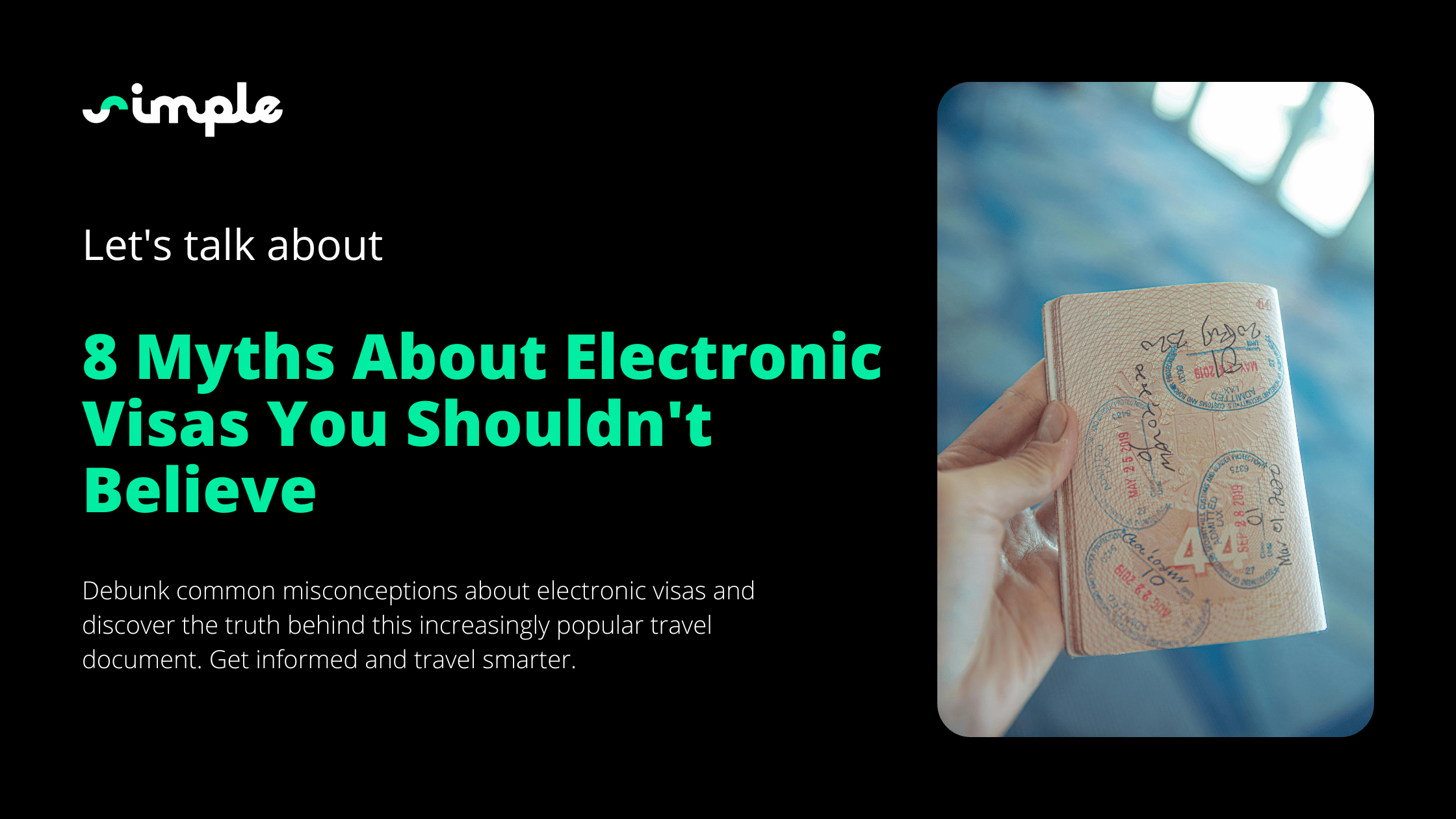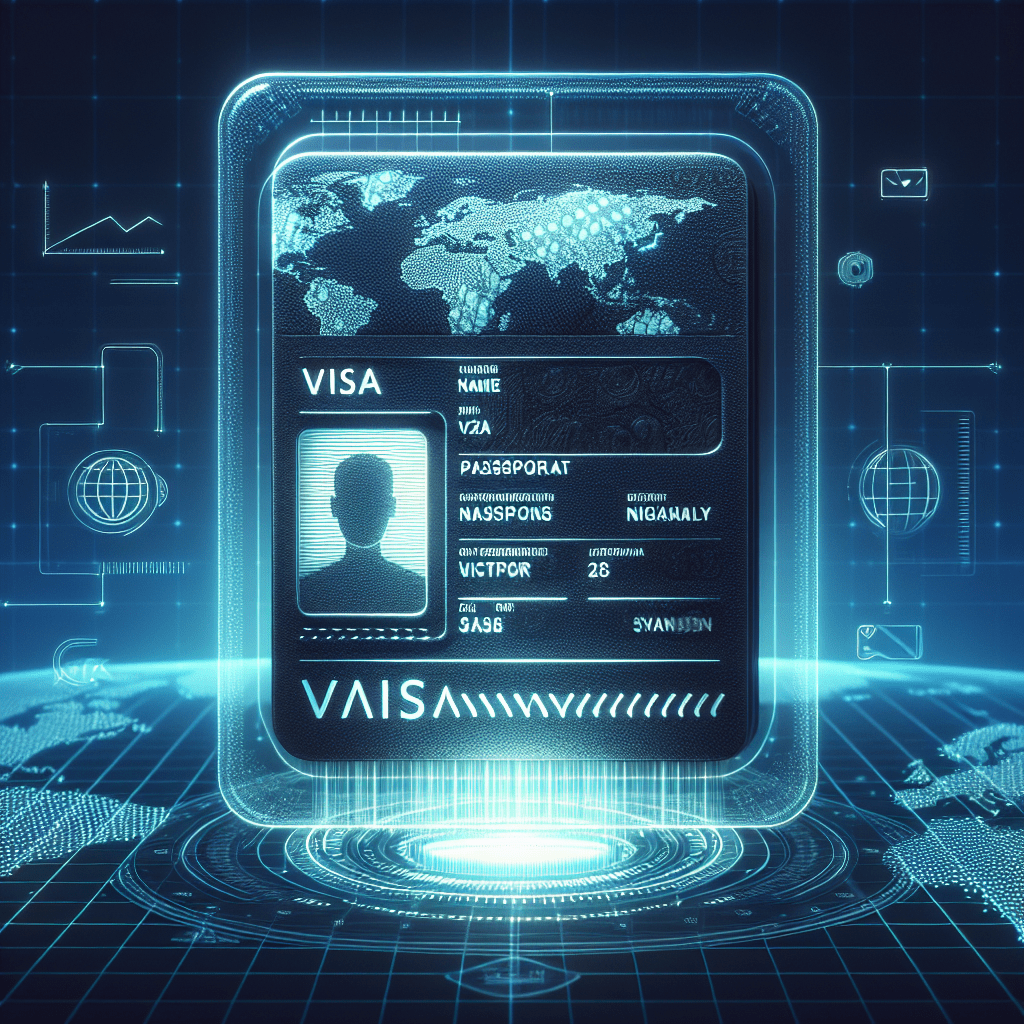3 Myths About Electronic Visas You Shouldn’t Believe

In recent years, electronic visas have revolutionized the way travelers gain entry to foreign countries. As global travel becomes more accessible, the demand for efficient and streamlined visa processes has surged. Electronic visas, or e-visas, have emerged as a popular solution, offering a convenient alternative to traditional visa applications. Despite their growing popularity, several misconceptions persist, clouding the understanding of how these digital travel authorizations truly function. It is crucial to look beyond these myths to fully appreciate the benefits and capabilities of electronic visas. By debunking these common misconceptions, travelers can enjoy smoother and more efficient journeys. Understanding the realities of electronic visas not only enhances the travel experience but also ensures compliance with international travel regulations. For those interested in learning more about electronic visas, you can find detailed information on the electronic visa page. As we delve into the myths surrounding electronic visas, it becomes evident that separating fact from fiction is essential for any modern traveler seeking to navigate the complexities of international travel with ease.

Myth 1: Electronic Visas Are Not Secure
Clarification of Robust Security Measures in Place
One of the most pervasive myths about electronic visas is the belief that they are not secure. This misconception often stems from a lack of understanding of the sophisticated security measures that governments employ to protect digital travel authorizations. Electronic visas are fortified with advanced encryption technologies that ensure the safety and integrity of personal data. These encryption protocols are designed to prevent unauthorized access and data breaches, making electronic visas as secure, if not more so, than traditional paper visas.
Governments around the world have invested heavily in cybersecurity infrastructure to support the implementation of electronic visa systems. This includes the use of multi-factor authentication, biometric verification, and secure data transmission channels. By leveraging these technologies, electronic visa systems can effectively safeguard sensitive information against cyber threats. In comparison, traditional visa processes, which often rely on physical documents, are more susceptible to forgery and loss. The transition to digital visa approval processes represents a significant advancement in travel security.
Examples of Successful Cybersecurity Implementations
Several countries have successfully implemented electronic visa systems with robust cybersecurity measures. For instance, Australia’s eVisitor program and India’s e-Tourist Visa system are prime examples of how digital travel authorizations can be both efficient and secure. These systems utilize state-of-the-art encryption and authentication technologies to protect applicants’ data. The success of these programs is evident in the positive feedback from travelers who appreciate the convenience and security of online visa applications.
Testimonials from travelers who have used electronic visas highlight the ease and peace of mind that come with digital entry permits. Many travelers report a seamless experience, from the online visa application process to the actual entry into the country. These positive experiences underscore the effectiveness of the security measures in place, dispelling the myth that electronic visas are inherently insecure.
Expert Opinions on the Safety of Electronic Visa Systems
Cybersecurity experts and international travel organizations have weighed in on the safety of electronic visa systems, providing valuable insights into their security features. Experts in the field of cybersecurity emphasize that electronic visas are designed with security as a top priority. They point out that the use of encryption and biometric verification significantly reduces the risk of identity theft and fraud.
Statements from international travel organizations further support the safety of electronic visa systems. These organizations recognize the benefits of digital travel authorizations, including enhanced security and efficiency. They advocate for the continued adoption of electronic visa services as a means to improve global travel experiences. By addressing security concerns head-on, experts and organizations alike contribute to a better understanding of the safety and reliability of electronic visas.

Myth 1: Electronic Visas Are Not Secure
Clarification of Robust Security Measures in Place
The notion that electronic visas lack security is a common misconception that fails to recognize the advanced protective measures integrated into these systems. Governments worldwide have implemented cutting-edge encryption technologies to ensure the security of digital travel authorizations. These encryption protocols are designed to protect sensitive personal information from unauthorized access and cyber threats, making electronic visas highly secure.
In addition to encryption, electronic visa systems often employ multi-factor authentication and biometric verification to further enhance security. These measures ensure that only authorized individuals can access and use the electronic travel permit. When compared to traditional visa processes, which rely on physical documents that can be lost or forged, electronic visas offer a more secure alternative. The transition to digital visa approval processes represents a significant advancement in safeguarding travelers’ information.
Examples of Successful Cybersecurity Implementations
Several countries have successfully implemented electronic visa systems with robust cybersecurity measures, demonstrating the effectiveness of these digital solutions. For instance, Australia’s eVisitor program and India’s e-Tourist Visa system are exemplary models of secure and efficient e-visa processing. These systems utilize state-of-the-art encryption and authentication technologies to protect applicants’ data, ensuring a secure online visa application experience.
Travelers who have used electronic visas often report positive experiences, highlighting the convenience and security of digital entry permits. Testimonials from these travelers emphasize the seamless nature of the online travel visa process, from application to entry. These positive experiences serve as evidence of the successful implementation of cybersecurity measures, dispelling the myth that electronic visas are insecure.
Expert Opinions on the Safety of Electronic Visa Systems
Cybersecurity experts and international travel organizations have provided valuable insights into the safety of electronic visa systems. Experts in the field of cybersecurity emphasize that electronic visas are designed with security as a top priority. They highlight the use of encryption and biometric verification as key factors in reducing the risk of identity theft and fraud.
International travel organizations also support the safety of electronic visa systems, recognizing the benefits of digital travel authorizations, including enhanced security and efficiency. These organizations advocate for the continued adoption of electronic visa services as a means to improve global travel experiences. By addressing security concerns directly, experts and organizations contribute to a better understanding of the reliability and safety of electronic visas.

Myth 2: Electronic Visas Are Always Expensive and Complicated
Explanation of Cost-Effective Nature and User-Friendly Application Processes
Contrary to the belief that electronic visas are costly and complex, they are often more affordable and straightforward than traditional visa processes. The cost-effectiveness of electronic visas is evident when comparing the fees associated with traditional visa applications. Traditional visa processes often involve multiple fees, including application fees, service charges, and sometimes even travel expenses to consulates or embassies. In contrast, electronic visas typically consolidate these costs into a single, transparent fee, making them a more economical choice for travelers.
Moreover, the user-friendly nature of online visa applications further dispels the myth of complexity. Many countries have developed intuitive web-based visa application platforms that guide users through each step of the process. These platforms are designed to be accessible to a wide range of users, providing clear instructions and support throughout the application process. The simplicity and efficiency of these digital systems make obtaining an electronic travel permit a hassle-free experience for most travelers.
Examination of Diverse Pricing Structures Across Different Countries
The pricing of electronic visas varies across different countries, reflecting a range of factors that influence costs. Some countries offer highly affordable electronic visas, making international travel more accessible to a broader audience. For example, countries like Turkey and Sri Lanka provide cost-effective e-visa options that cater to budget-conscious travelers. These affordable options demonstrate that electronic visas are not inherently expensive and can be a viable choice for travelers seeking economical travel solutions.
Several factors contribute to the pricing of electronic visas, including the duration of stay, the purpose of travel, and bilateral agreements between countries. These factors can lead to variations in e-visa processing fees, but they also allow for flexibility in pricing structures. By understanding these factors, travelers can make informed decisions and choose electronic visa services that align with their budget and travel needs.
Stories from Satisfied Travelers Regarding Their Application Experiences
Many travelers have shared positive experiences with electronic visa applications, highlighting the ease and efficiency of the process. User testimonials often emphasize the straightforward nature of online immigration visa applications, with many travelers appreciating the time saved compared to traditional methods. The convenience of completing an online travel visa application from the comfort of one’s home is a significant advantage that resonates with modern travelers.
Feedback from satisfied travelers frequently mentions the quick turnaround times associated with digital visa approval. The ability to receive an electronic entry permit within a short period is a testament to the efficiency of e-visa platforms. These positive experiences underscore the user-friendly and cost-effective nature of electronic visas, challenging the misconception that they are expensive and complicated. By sharing these stories, travelers contribute to a more accurate understanding of the benefits of electronic visas.

Myth 3: Electronic Visas Are Not Widely Accepted
Overview of Countries Adopting Electronic Visa Systems
The belief that electronic visas are not widely accepted is increasingly outdated as more countries embrace digital travel authorization systems. A growing number of nations across various continents have implemented electronic visa services, recognizing the benefits they offer to both travelers and immigration authorities. Countries such as Australia, India, Turkey, and Kenya have been at the forefront of adopting e-visa platforms, providing travelers with a streamlined and efficient way to obtain travel permits.
Regions like Southeast Asia and the Middle East are also seeing a gradual increase in the adoption of electronic visa systems. This trend reflects a global shift towards digital solutions in the travel industry, driven by the need for more efficient and secure visa processing methods. As more countries recognize the advantages of electronic entry permits, the acceptance of e-visas continues to expand, making them a viable option for international travelers worldwide.
Benefits of Electronic Visas for International Travel
Electronic visas offer numerous benefits that enhance the international travel experience. One of the primary advantages is the convenience and efficiency they provide at entry points. With an electronic visa, travelers can bypass lengthy queues and paperwork, allowing for a smoother and faster entry process. This efficiency is particularly beneficial in busy airports and border crossings, where time is of the essence.
Additionally, electronic visas contribute to faster processing times at immigration checkpoints. The digital nature of e-visa processing allows for quick verification and approval, reducing wait times for travelers. This efficiency not only improves the travel experience but also helps immigration authorities manage the flow of visitors more effectively. By streamlining the entry process, electronic visas enhance the overall efficiency of international travel.
Updates on the Expansion of Electronic Visa Acceptance
Recent developments in electronic visa policies indicate a continued expansion of acceptance across the globe. Many countries are updating their visa policies to include electronic options, reflecting a growing recognition of the benefits of digital visa approval systems. For instance, several European countries are exploring the implementation of e-visa platforms to facilitate travel within the region.
Predictions for future adoption trends in the travel industry suggest that electronic visas will become even more prevalent. As technology continues to advance, the capabilities of internet-based visa systems are expected to improve, making them an increasingly attractive option for both travelers and governments. The ongoing expansion of electronic visa acceptance is a testament to the effectiveness and convenience of these systems, challenging the myth that they are not widely accepted.

Conclusion
Dispelling myths about electronic visas is crucial for enhancing travel preparedness and ensuring a smooth journey. Misconceptions about the security, cost, and acceptance of electronic visas can deter travelers from taking advantage of these efficient systems. By understanding the realities of electronic visa services, travelers can make informed decisions that enhance their travel experiences. Recognizing the robust security measures, cost-effectiveness, and widespread acceptance of electronic visas allows travelers to approach their journeys with confidence and peace of mind. As the travel industry continues to evolve, staying informed about the latest developments in visa processing is essential for any modern traveler. By debunking these myths, we pave the way for a more streamlined and enjoyable travel experience, free from unnecessary complications and concerns.
Electronic visas represent a smart option for travelers seeking convenience and efficiency in their travel plans. The advantages of digital travel authorizations, from simplified online visa applications to faster processing times, make them an attractive choice for international travelers. As more countries adopt electronic visa systems, the accessibility and benefits of these services continue to grow. Travelers are encouraged to consider electronic visas as a viable alternative to traditional visa processes, taking advantage of the ease and security they offer. By embracing electronic visas, travelers can enjoy a more seamless and efficient journey, allowing them to focus on the experiences and adventures that await them. As the world becomes increasingly interconnected, electronic visas stand out as a forward-thinking solution that aligns with the needs of today’s global travelers.